Search titles
Displaying results 131 to 140 of 142.

Pacific Exposures »
Photography and the Australia–Japan Relationship
Authored by: Melissa Miles, Robin Gerster
Publication date: December 2018
Photography has been a key means by which Australians have sought to define their relationships with Japan. From the fascination with all things Japanese in the late nineteenth century, through the era of ‘White Australia’, the bitter enmity of the Pacific War, the path to reconciliation in the post-war period and the culturally complicated bilateralism of today, Australians have used their cameras to express a divided sense of conflict and kinship with a country that has by turns fascinated and infuriated. The remarkable photographs collected and discussed here for the first time shed new light on the history of Australia’s engagement with its most important regional partner. Pacific Exposures argues that photographs tell an important story of cultural production, response and reaction—not only about how Australians have pictured Japan over the decades, but how they see their own place in the Asia-Pacific.
‘Pacific Exposures presents the first study of the photographic exchanges between Australia and Japan—its photographers, personalities, motivations, anxieties and tensions—based on a diverse range of archival materials, interviews, and well-chosen photographs.’
— Dr Luke Gartlan, University of St Andrews
‘[Pacific Exposures] will become a key text on Australia’s interactions with Japan, and the way that photographs can inform cross-cultural relations through their production, consumption and circulation.’
— Prof. Kate Darian-Smith, University of Tasmania
In the media
Listen to the ABC Radio interview: Japan in Focus (from 13:06).
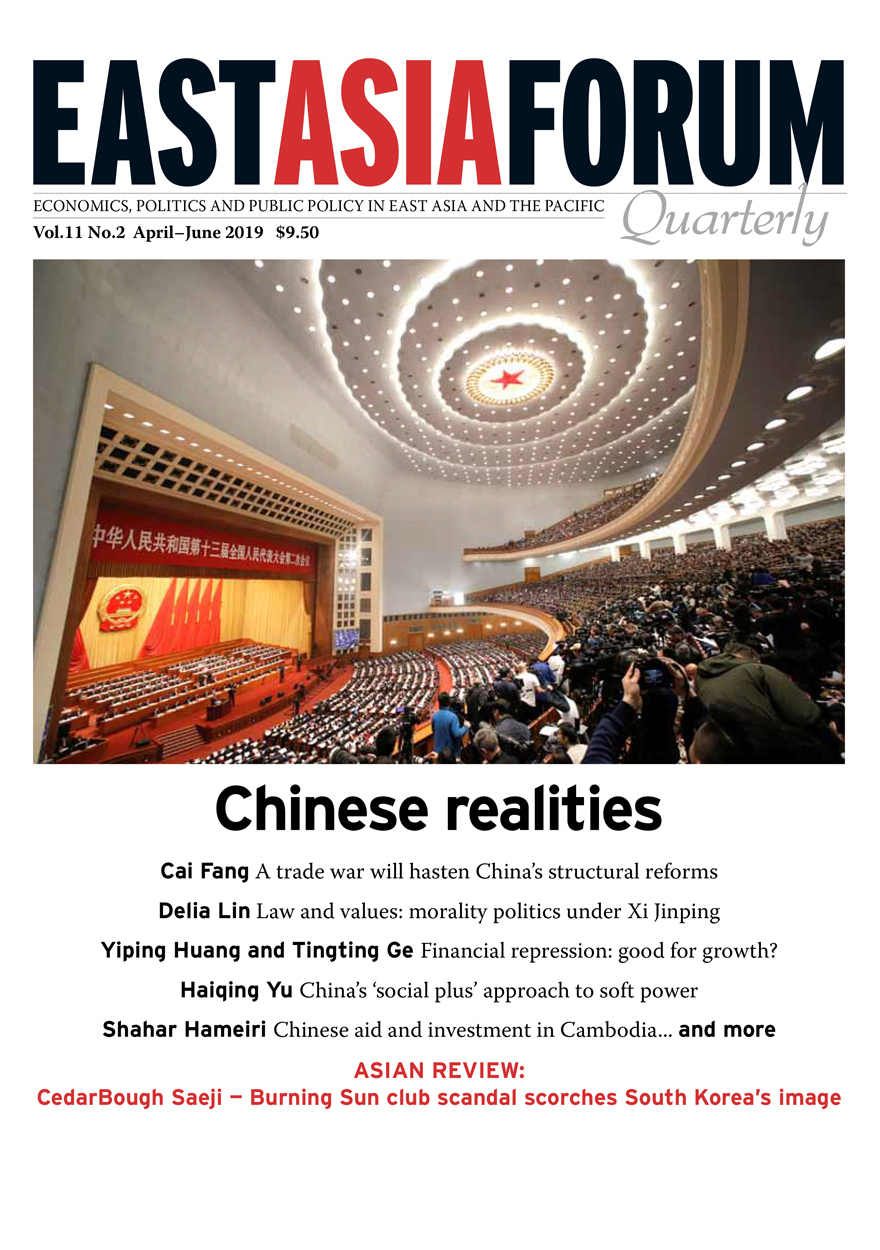
East Asia Forum Quarterly: Volume 11, Number 2, 2019 »
Publication date: June 2019
The global debate on China is becoming more polarised. Is the Chinese economy robust or on the brink of collapse? Does the concentration of power in the hands of President Xi reflect a weaker or more confident China? Is the Belt and Road Initiative a platform for improving global infrastructure, or a strategy to make developing countries more dependent on China? And is Beijing succeeding in its overseas influence campaign, or has China’s global influence diminished in the face of a backlash?In this special issue of East Asia Forum Quarterly, experts from within and outside China force us to confront the complicated, evolving, and often contradictory forces shaping Chinese society, politics, economics and global affairs.
East Asia Forum Quarterly grew out of East Asia Forum (EAF) online, which has developed a reputation for providing a platform for the best in Asian analysis, research and policy comment on the Asia Pacific region in world affairs. EAFQ aims to provide a further window onto research in the leading research institutes in Asia and to provide expert comment on current developments within the region. The East Asia Forum Quarterly, like East Asia Forum online, is an initiative of the East Asia Forum (EAF) and its host organisation, the East Asian Bureau of Economic Research (EABER) in the Crawford School of Economics and Government in the College of Asia & the Pacific at The Australian National University.
Download for free
Not available for purchase
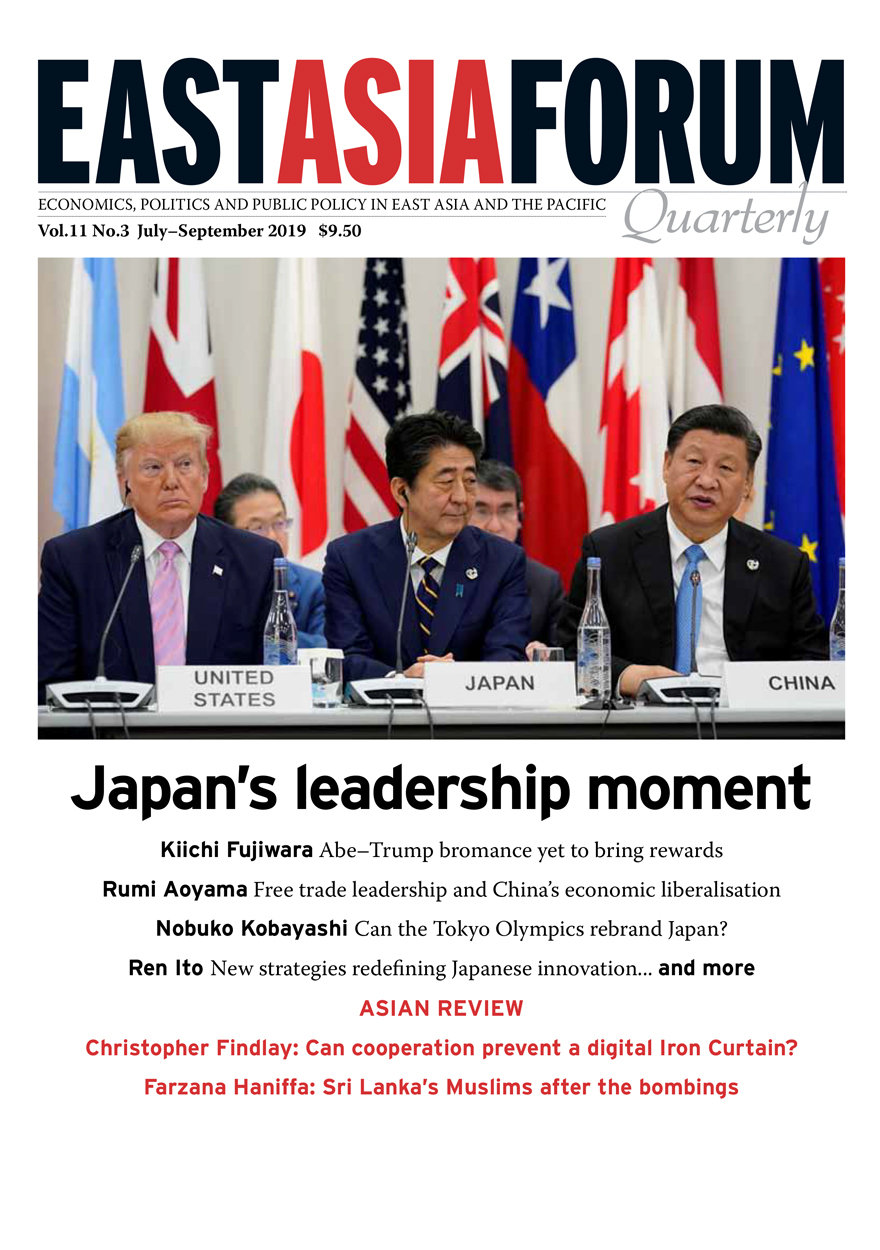
East Asia Forum Quarterly: Volume 11, Number 3, 2019 »
Publication date: August 2019
When Shinzo Abe was given a second chance at the Japanese prime ministership in 2012, Japan was in the throes of a period of intense domestic turmoil. After six prime ministers in six years, the nation was in desperate need of political stability. Abe has not only delivered that but is now set to become the longest-serving prime minister in modern Japanese history.
Abe commenced his second term with an ambitious policy program focused on reinvigorating the nation’s stagnant economy, amending the constitution to achieve a more ‘normal’ defence and security policy, and engaging proactively in regional and global affairs.
To what extent has Abe achieved these policy goals? How has he utilised the immense political capital accrued throughout his leadership tenure? And what will be the legacy that Abe leaves when his prime ministership ultimately comes to an end? In this issue of East Asia Forum Quarterly, scholars from both inside and outside Japan grapple with these questions.
East Asia Forum Quarterly grew out of East Asia Forum (EAF) online, which has developed a reputation for providing a platform for the best in Asian analysis, research and policy comment on the Asia Pacific region in world affairs. EAFQ aims to provide a further window onto research in the leading research institutes in Asia and to provide expert comment on current developments within the region. The East Asia Forum Quarterly, like East Asia Forum online, is an initiative of the East Asia Forum (EAF) and its host organisation, the East Asian Bureau of Economic Research (EABER) in the Crawford School of Economics and Government in the College of Asia & the Pacific at The Australian National University.
Download for free
Not available for purchase

East Asia Forum Quarterly: Volume 11, Number 4, 2019 »
Publication date: November 2019
The idea that countries can pursue prosperity and security as separate streams of the national interest has passed. Economics and security have always been enmeshed, although we assumed otherwise. The nature of the relationship between the two is changing fast. The narratives that surround the change find it difficult to keep up with the facts.
The world has become more multipolar, with remarkable growth outside the established powers in the North Atlantic. And big countries—not just the United States and China, but other G20 members like Brazil, Turkey, Russia and the United Kingdom—have become more nationalist and brazen in asserting what they perceive to be their economic and security interests over those of others. The US–China relationship is increasingly characterised by strategic competition in both the economic and security domains.
At the same time, digital technology has not just transformed products, firms and markets, it has opened them to cyber disruption and attack, resulting in a cross-over of security into the economic and social domains.
This issue of the East Asia Forum Quarterly explores what is happening, why and how to respond to the change. These essays argue for careful thought and active engagement by governments, business and the broader community. Genuine dialogue and problem-solving between the economic and security parts of universities and government is a good first step to frame the problem broadly, keep perspective and find solutions.
East Asia Forum Quarterly grew out of East Asia Forum (EAF) online, which has developed a reputation for providing a platform for the best in Asian analysis, research and policy comment on the Asia Pacific region in world affairs. EAFQ aims to provide a further window onto research in the leading research institutes in Asia, and to provide expert comment on current developments within the region. East Asia Forum Quarterly, like East Asia Forum online, is an initiative of the East Asia Forum and its host organisation, the East Asian Bureau of Economic Research in the Crawford School of Economics and Government in the College of Asia & the Pacific at The Australian National University.
Download for free
Not available for purchase

A Cautious New Approach »
China's Growing Trilateral Aid Cooperation
Authored by: Denghua Zhang
Publication date: March 2020
‘As a student of international relations and a former diplomat, Zhang brings the insights of a practitioner and the eye of scholar to explain why Chinese actors choose to engage in aid cooperation with traditional donors in the Asia-Pacific. This book is among the first to take a holistic approach to understanding the motivations of the many agencies involved in China’s aid program, and it will challenge the expectations of many readers.’
—Dr Graeme Smith, The Australian National University
‘This book breaks new ground by examining a little-known dimension of China’s foreign policy: trilateral aid cooperation. Denghua Zhang sets this highly original analysis in the context of the new assertiveness of Chinese foreign policy under Xi Jinping, the China International Development Cooperation Agency established in 2018, and the Belt and Road Initiative, which now serves as the framework for Chinese overseas aid and engagement. At a time when the debate in the West about the rise of China has intensified, not always knowledgeably, this book fills an important gap in our understanding of China in Southeast Asia and the Pacific.’
—Dr Stewart Firth, The Australian National University
‘This thoroughly researched work examines trilateral cooperation as a new and interesting aspect of China’s growing international aid program, and as a window into the changing nature of that program as well as the wider foreign policy in which it is embedded. The broad themes and topics discussed are clearly significant, ultimately touching on one of the most important international issues of our time, the implications of the rise of China for a long-established Western-dominated international system.’
—Prof. Terence Wesley-Smith, University of Hawai‘i

East Asia Forum Quarterly: Volume 11, Number 1, 2019 »
Publication date: March 2019
This issue of East Asia Forum Quarterly touches on key economic and social questions that affect gender equality in Southeast Asia and East Asia, delving beneath the aggregates and measurement challenges. Strengthening the evidence base is critical to building the policy toolkit and shaping public investments that ensure no woman or man is left behind.
East Asia Forum Quarterly grew out of East Asia Forum (EAF) online, which has developed a reputation for providing a platform for the best in Asian analysis, research and policy comment on the Asia Pacific region in world affairs. EAFQ aims to provide a further window onto research in the leading research institutes in Asia and to provide expert comment on current developments within the region. The East Asia Forum Quarterly, like East Asia Forum online, is an initiative of the East Asia Forum (EAF) and its host organisation, the East Asian Bureau of Economic Research (EABER) in the Crawford School of Economics and Government in the College of Asia & the Pacific at The Australian National University.
Download for free
Not available for purchase
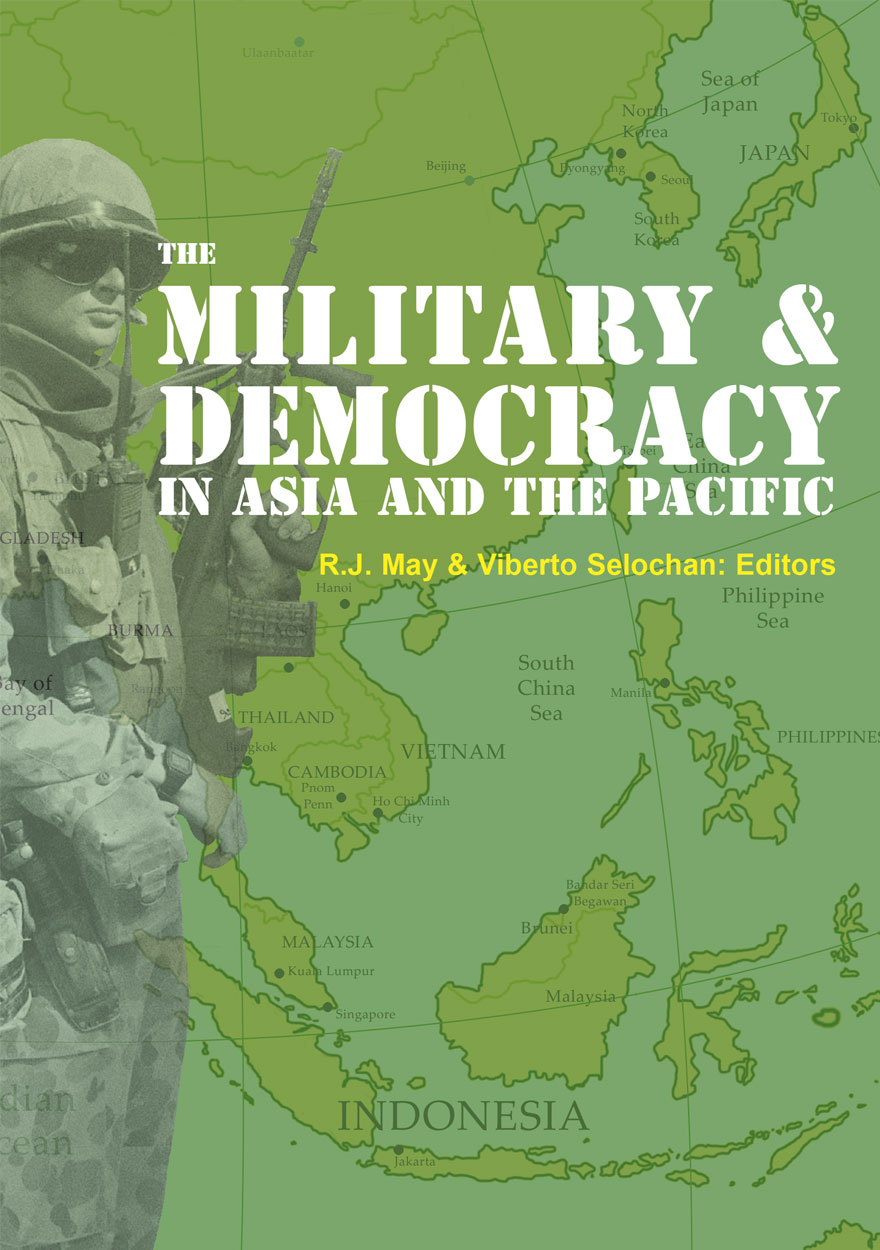
The Military and Democracy in Asia and the Pacific »
Edited by: R.J. May, Viberto Selochan
Publication date: March 2004
In The Military and Democracy in Asia and the Pacific, a number of prominent regional specialists take a fresh look at the military’s changing role in selected countries of Asia and the Pacific, particularly with regard to the countries’ performance against criteria of democratic government.
Indonesia, Thailand, the Philippines, Burma, Pakistan, Bangladesh, South Korea, Fiji and Papua New Guinea all fall under the spotlight as the authors examine the role which the military has played in bringing about changes of political regime, and in resisting pressures for change.
Under the auspices of The Australian National University’s Department of Political and Social Change, Research School of Pacific and Asian Studies, and within the context of the Regime Change and Regime Maintenance in Asia and the Pacific project, the following contributors compiled The Military and Democracy in Asia and the Pacific: Emajuddin Ahamed, Suchit Bunbongkarn, Stephanie Lawson, R. J. May, Hasan-Askari Rizvi, Viberto Selochan, Josef Silverstein, Michael Vatikiotis and Yung Myung Kim. The Military and Democracy in Asia and the Pacific provides a sequel to Viberto Selochan’s earlier collection, The Military, the State, and Development in Asia and the Pacific (1991).
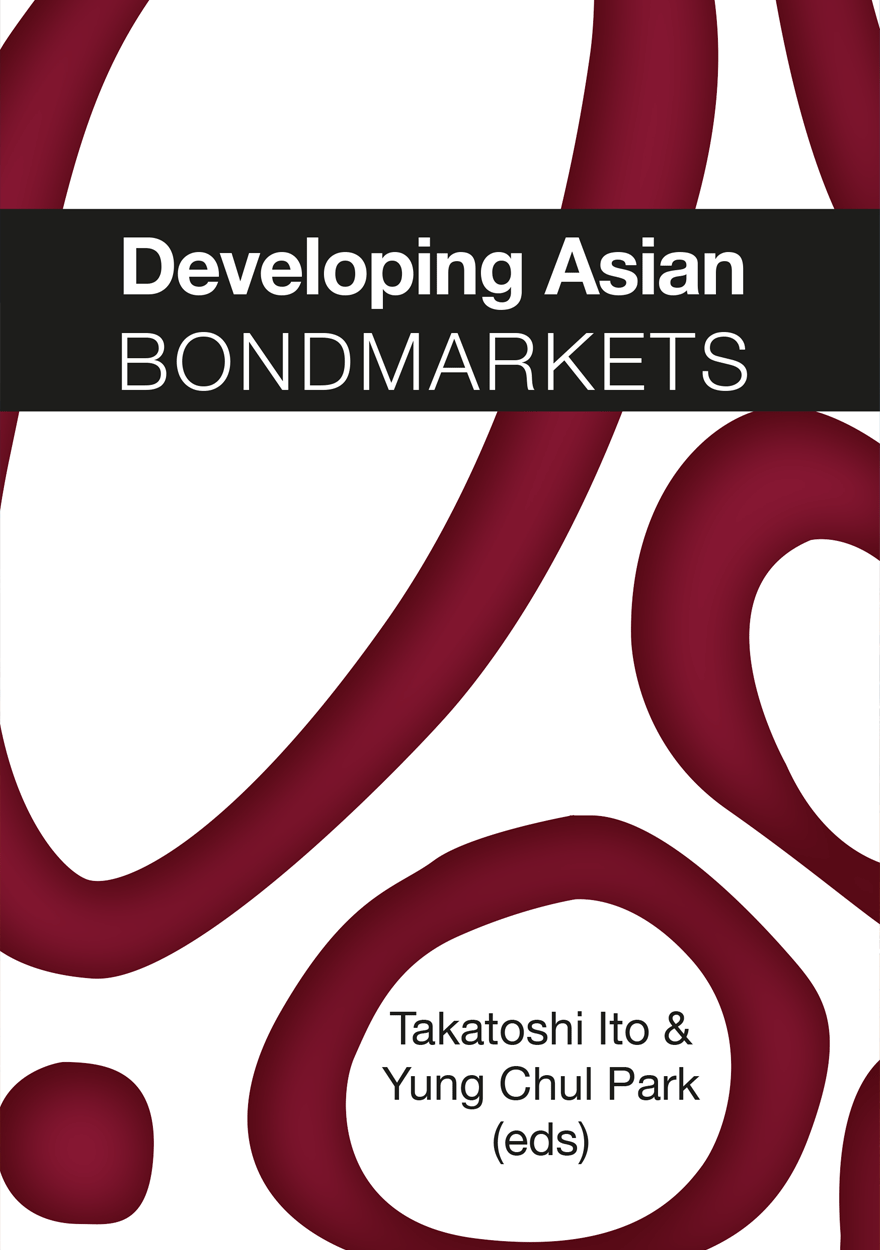
Developing Asian Bondmarkets »
Edited by: Takatoshi Ito, Yung Chul Park
Publication date: January 2014
The absence of vibrant bondmarkets in East Asia was a significant contributor to the 1997–98 financial crisis. Ever since, the development of local bondmarkets has been a major objective of financial reforms in many East Asian economies. This effort has been frustrated by the inability to reach a consensus on whether Asian bondmarkets are truly needed in East Asia, whether they can be made viable in the competitive environment of the global economy, how they should be created and what role intergovernmental cooperation should play in their definition and creation.
Developing Asian Bondmarkets helps build this consensus, proposing how to develop robust and efficient bondmarkets in East Asia.
This book, the first of its kind, comes from the Finance Forum of the Pacific Economic Cooperation Council.
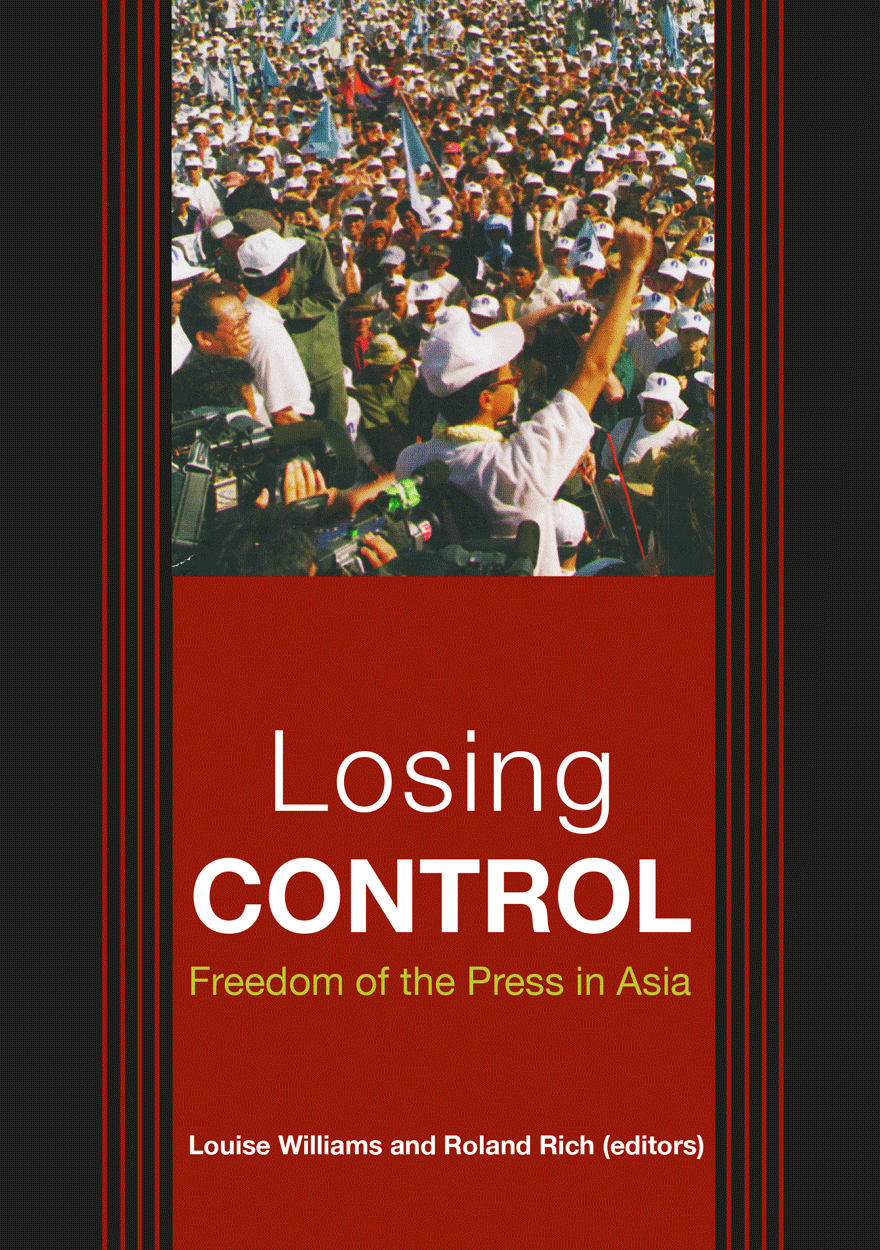
Losing Control »
Freedom of the Press in Asia
Edited by: Louise Williams, Roland Rich
Publication date: January 2014
‘A free press is not a luxury. A free press is at the absolute core of equitable development’ according to World Bank President James Wolfensohn. A free press is also the key to transparency and good governance and is an indispensable feature of a democracy. So how does Asia rate? In Losing Control, leading journalists analyse the state of play in all the countries of North Asia and Southeast Asia. From the herd journalism of Japan to the Stalinist system of North Korea, Losing Control provides an inside look at journalism and freedom of the press in each country. One conclusion—a combination of new technology and greater democracy is breaking the shackles that once constrained the press in Asia.
‘Brings together Asia’s best and brightest observers of the press.’
Hamish McDonald, Foreign Editor, The Sydney Morning Herald
‘A rare insiders’ view exposing the real dynamics behind social and political change in Asia.’
Evan Williams, Foreign Correspondent, ABC TV
‘A timely and necessary contribution to the debate over the quality of freedom in Asia.’
Geoffrey Barker, The Australian Financial Review
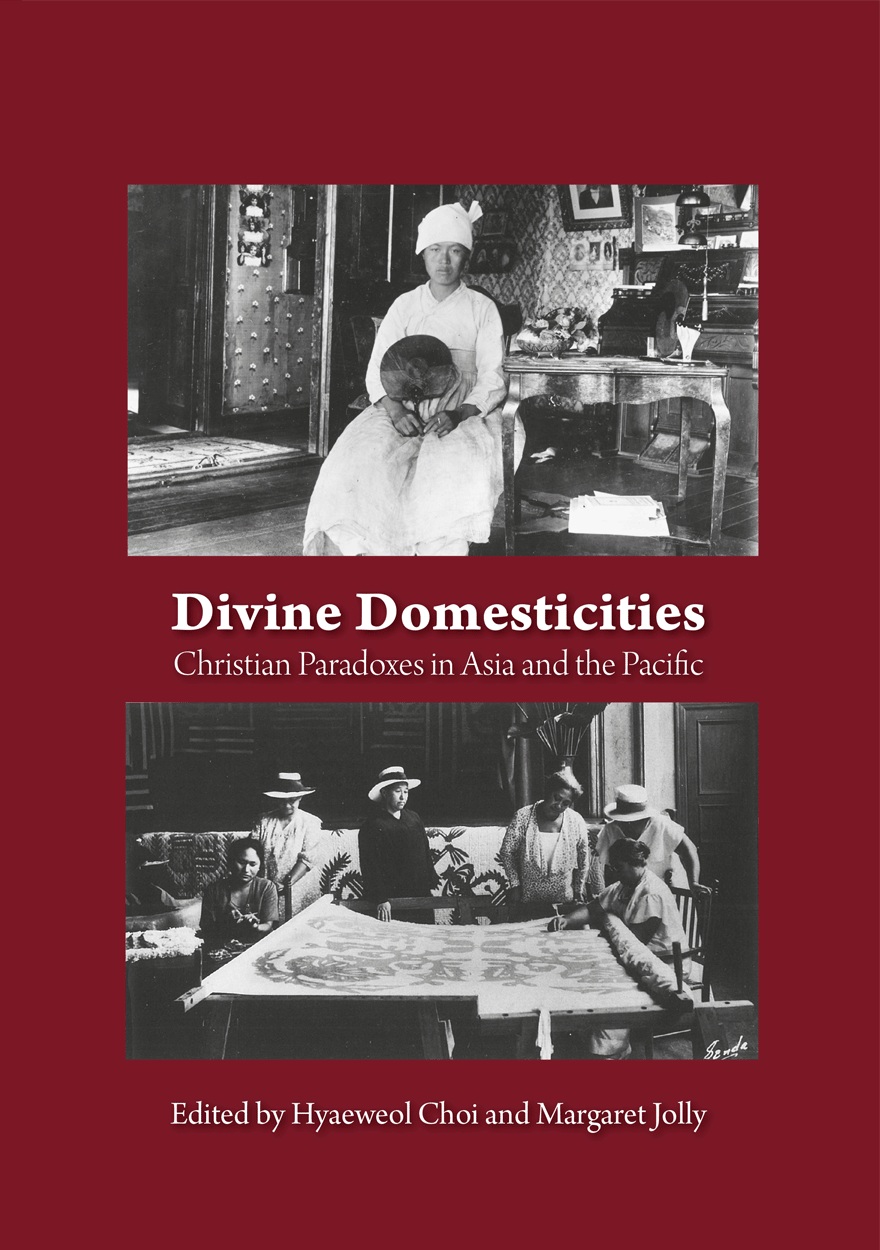
Divine Domesticities »
Christian Paradoxes in Asia and the Pacific
Edited by: Hyaeweol Choi, Margaret Jolly
Publication date: October 2014
Divine Domesticities: Christian Paradoxes in Asia and the Pacific fills a huge lacuna in the scholarly literature on missionaries in Asia/Pacific and is transnational history at its finest. Co-edited by two eminent scholars, this multidisciplinary volume, an outgrowth of several conferences/seminars, critically examines various encounters between western missionaries and indigenous women in the Pacific/Asia … Taken as a whole, this is a thought-provoking and an indispensable reference, not only for students of colonialism/imperialism but also for those of us who have an interest in transnational and gender history in general. The chapters are very clearly written, engaging, and remarkably accessible; the stories are compelling and the research is thorough. The illustrations are equally riveting and the bibliography is extremely useful.
—Theodore Jun Yoo, History Department, University of Hawai’i
The editors of this collection of papers have done an excellent job of creating a coherent set of case studies that address the diverse impacts of missionaries and Christianity on ‘domesticity’, and therefore on the women and children who were assumed to be the rightful inhabitants of that sphere … The introduction to the volume is beautifully written and sets up the rest of the volume in a comprehensive way. It explains the book’s aim to advance theoretical and methodological issues by exploring the role of missionary encounters in the development of modern domesticities; showing the agency of indigenous women in negotiating both change and continuity; and providing a wide range of case studies to show ‘breadth and complexity’ and the local and national specificities of engagements with both missionaries and modernity. My view is that all three aims are well and truly fulfilled.
—Helen Lee, Head, Sociology and Anthropology, La Trobe University, Melbourne



